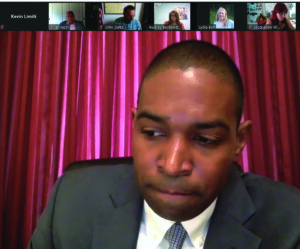Chamber forum seeks
solutions for workforce shortage
By KEVIN LIMITI • Special to www.AllOTSEGO.com

The Otsego County Chamber of Commerce hosted a Zoom town hall Tuesday, July 27, to discuss workforce needs for small businesses.
The participants included Congressman Antonio Delgado, D-19, State Sen. Peter Oberacker, R-Maryland, Assemblyman John Salka, R-Brookfield, Assemblyman Brian Miller, R-New Hartford, and Assemblyman Chris Tague, R-Schoharie.
The overall sentiments of the Zoom call echoed the reality of a huge problem with understaffing and the difficulties hiring employees in Otsego County.
Business owners spoke of restaurants being unable to service customers due to staff shortages and some businesses being forced to close early based on having no staff available.
Audrey Benkenstein, from Opportunities for Otsego, spoke about how many of her organization’s positions required advanced degrees and training, which made finding employees very difficult.
“We serve a vulnerable population and without staffing our programs suffer,” Benkenstein said. She said there were also lack of transportation options, lack of internet issues and lack of day care assistance available.
Lydia Bell, also from Opportunities for Otsego, echoed Benkenstein’s thoughts.
“We’re very much struggling getting people even interested in applying,” Bell said.
Salka said the biggest problem was lack of incentives because of unemployment benefits. “When people can make more money sitting at home, obviously they’re going to sit home,” Salka said.
Delgado had a different take on the assistance, saying it was needed to protect vulnerable people during the pandemic. “It was unclear at the time how fast the economy was coming back,” Delgado said.
However, he said the benefits will expire soon and, “I think it’s unlikely that at the federal level there will be another round of (enhanced) unemployment.”
Cassandra Harrington, executive director of Destination Marketing, said that job opportunities exist, but people are not applying.
“There are jobs to be had,” Harrington said. “There are plenty out there.”
Harrington said lack of staffing was affecting businesses, keeping them from being open. She said many restaurants are having a difficult time staying open during weekends, which she said that “results in poor experiences for the visitor” and is adversely affecting tourism.
“We can’t guarantee we’re putting our best foot forward right now,” Harrington said.
She said there was a “massive amount of money that we’re turning away” while also having a “significant risk of burnout for our current staffers.”
“I just hope that somehow we can figure out a way to fix this,” Harrington said.
Miller said part of the problem is the pandemic has changed society in many different ways, including what people will tolerate.
“This isn’t unique to Otsego County. This is everywhere. People may have reexamined their lives. They don’t want their second jobs.”
Miller said he has no solutions.
“I don’t really know what the answer is right now,” he said.
Tague said the “biggest complaint I get from small businesses is they can’t get any help.”
Before leaving the Zoom, Delgado said the Restaurant Revitalization Fund “needs to be replenished.”
Mark Segina, CEO of Segina and Associates, had some practical advice for his fellow business owners.
“You have to have a way you can generate more income to pay employees,” Segina said.
“You have to find someone who has a reason to go locally. … You’re investing in skills, you’re investing in people who will drive you forward.”
Salka called the issue a “systemic issue in New York state with quality of life.” He said New York has some of the highest taxes and is one of the least friendly states for business, which is making things difficult for the business community. “God knows why we would even think about extending unemployment benefits,” Salka said. “New York has been suffering for quite some time from a
mass migration.”
Chamber President Al Rubin, who was also moderating, said “the longer (people) are out of work, the less they’re willing to go back to work.”
Tom Armao of Country Club Auto Group, said business owners were competing with the federal government. “We’re paying more for nothing and we’re getting nothing.”
“You can’t legislate prosperity, you have to grow prosperity,” Armao said.


“They don’t want their second jobs.” Did anyone in attendance see what’s wrong with this statement?